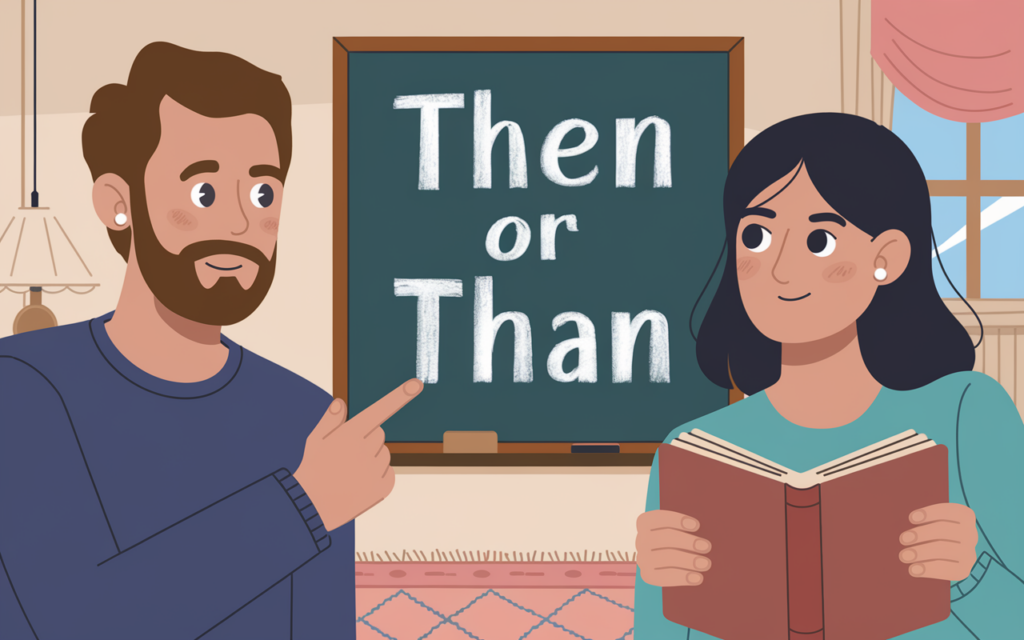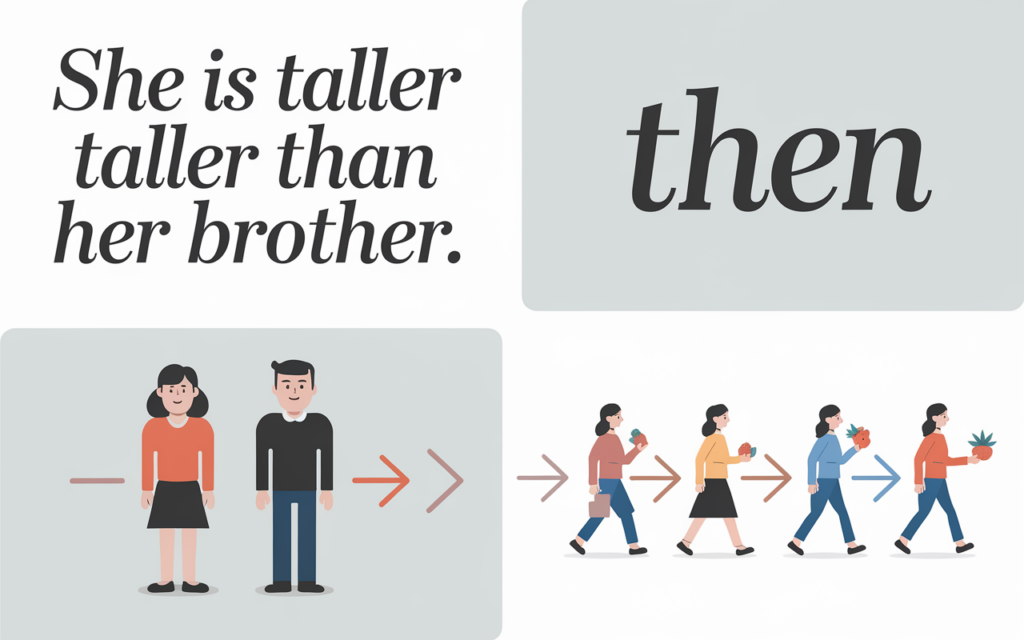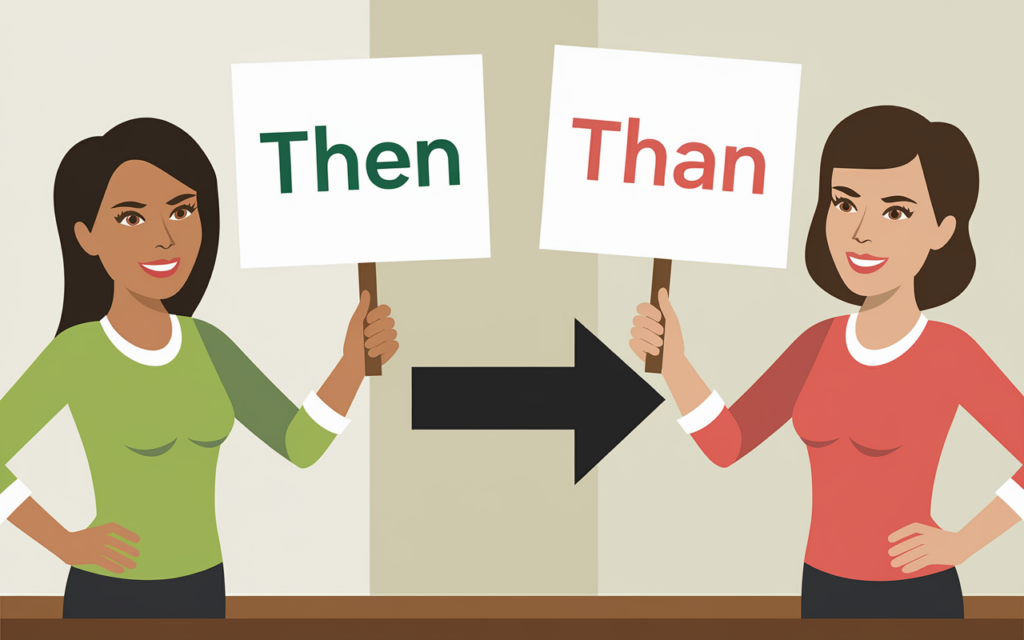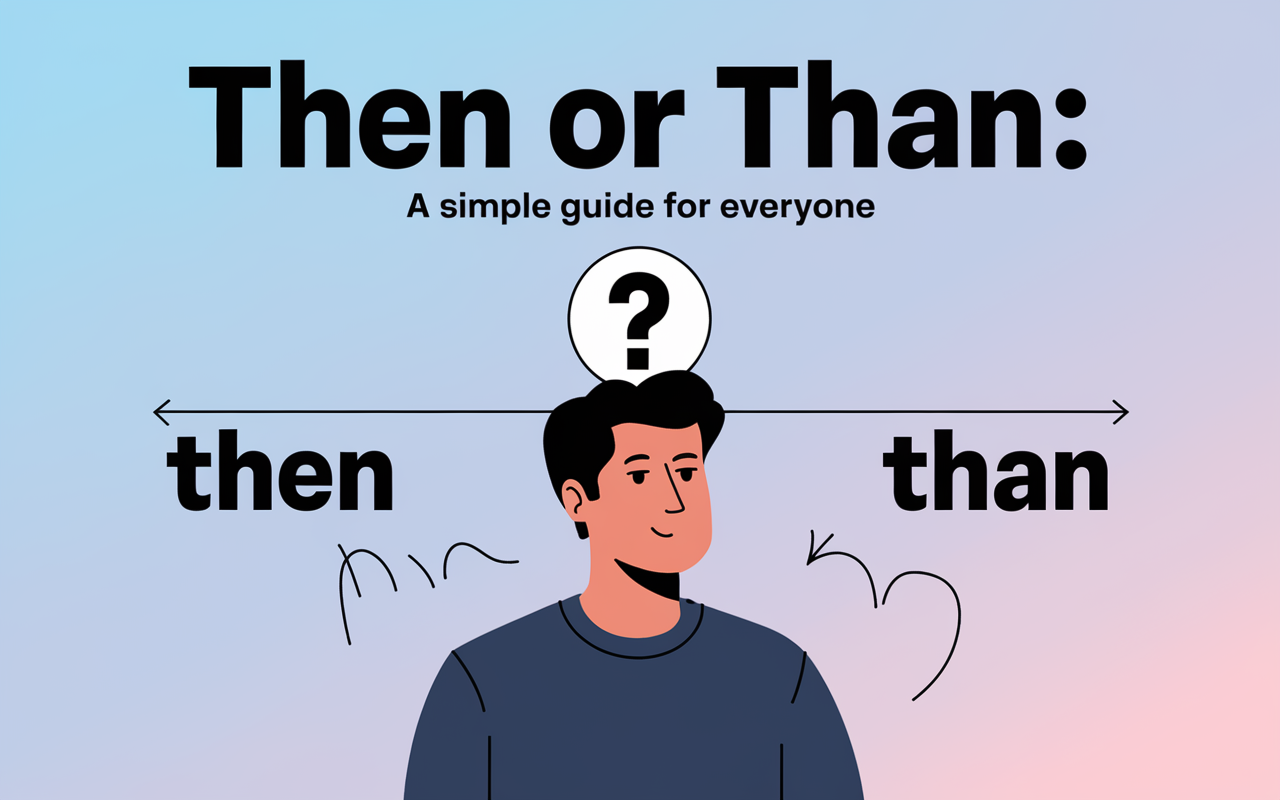Introduction
Words can sometimes be tricky, especially when they sound alike but mean different things. Two words that often confuse people are “then or than.” If you’ve ever wondered about “then or than” and how to use them correctly, you’re not alone! This article will explain everything you need to know. We’ll break it down so you can feel confident using these words daily.
The goal here is to make things clear and straightforward. Whether you’re writing a text message, an email, or just chatting with a friend, knowing the difference between “then” and “than” can help you avoid mistakes. Let’s dive in and explore what these words mean, how they work, and why they matter.
Table of Contents
What Does “Then” Mean?
First, let’s talk about “then.” This word is all about time or sequence. It tells you when something happens or the order of events. For example, if you say, “I ate dinner, then I watched TV,” you show that one thing happened after another. “Then” is like a bridge that connects moments or steps.
Think of “then” as a word that helps you plan or describe what comes next. Imagine you’re giving directions: “Turn left, then go straight.” Here, “then” shows the next step. It’s simple and helpful in keeping things in order. People always use ” then ” without thinking about it, but knowing how it fits into sentences is good.
What Does “Than” Mean?
Now, let’s switch to “than.” This word is different because it’s about comparing things. When you want to say one thing is more significant, smaller, faster, or better than another, you use “than.” For instance, “Pizza is better than salad” compares two foods. “Than” helps you weigh one option against another.
Here’s an easy way to remember: “than” is for differences. If you’re picking between two things or saying one is more or less than the other, “than” is your word. It’s common in sentences like “She is taller than me” or “This bag is heavier than that one.” Comparisons are everywhere, and “than” makes them apparent.

Why Do People Mix Up “Then or Than”?
So why do people get confused about “then or than”? One big reason is that they sound similar when you say them out loud. In past conversations, it’s easy to miss the difference. They’re both short words, and our brains sometimes skip over the details. But even though they sound alike, their jobs in a sentence are different.
Another reason for the mix-up is that English can feel tricky. Some folks might write “I’ll call you, than we’ll talk” when they mean “then.” It’s an honest mistake! Knowing when to use “then or than” takes a little practice, but once you get it, it’s like riding a bike—you won’t forget.
How to Use “Then” in Everyday Sentences
Let’s look at “then” in action. This word is perfect for telling stories or listing steps. Say you’re explaining your day: “I woke up, then I brushed my teeth, then I had coffee.” Each “then” moves the story forward. It’s like a timeline, in your words.
You can also use “then” to discuss what happens next in a plan. For example, “We’ll finish this article, then take a break.” It’s all about timing and order. If unsure, ask yourself: Am I talking about when something happens? If yes, “then” is the right choice.
How to Use “Than” in Everyday Sentences
Now, let’s try “than” in some examples. This word shines when you’re comparing stuff. Imagine you’re at the store: “This shirt is cheaper than that one.” You’re pointing out a price difference. Or maybe you say, “I’d rather read than watch TV.” Here, “than” shows your preference between two options.
The trick with “than” is to check if you’re measuring one thing against another. Are you saying something is more, less significant, or more minor? If so, “than” fits perfectly. It’s a small word, but it does a big job of making comparisons clear.
Quick Tips to Remember “Then or Than”
Suppose you’re still unsure about “then or than,” here are some easy tips. For “then,” think of time—words like “when” or “next” go with it. Picture a clock or a list of steps. For “than,” think of a scale comparing two things, like weighing apples and oranges. If it’s about differences, go with “than.”
A fun way to practice is to say your sentence out loud. Does it sound like a sequence? Use “then.” Does it feel like a comparison? Use “than.” Picking between “then or than” will feel natural with some practice.

Common Mistakes with “Then or Than”
Even smart people mess up “then or than” sometimes. One standard error is writing “He’s faster then me” when it should be “He’s faster than me.” Since it’s a comparison, “than” is correct. Another mistake is “I’ll eat, than I’ll sleep,” which should be “then” because it’s about the order of events.
These slip-ups happen because our brains move fast, and the words sound so close. But catching these mistakes is easy once you know the rules. Just pause and think: Is this about time or comparison? That quick check can save you from mixing up “then or than.”
Examples to Practice “Then or Than”
Let’s try some examples to lock this in. Look at this sentence: “She studied, then she took the test.” Here, “then” shows what happened next. Now try this: “Her score was higher than mine.” See how “than” compares the scores? It’s straightforward once you spot the pattern.
Here’s another pair: “I’ll call you, then we’ll plan the party” (time sequence) versus “I like tea more than coffee” (comparison). Play with sentences like these, and you’ll get the hang of “then or than” in no time.
Why Does It Matter to Get “Then or Than” Right?
You might wonder, does it matter if I mix up “then or than”? Well, yes and no. In casual chats, people might not notice. But in writing—like emails, schoolwork, or job applications—using the right word shows you pay attention to details. It makes your message more transparent and more professional.
Imagine reading, “I’ll finish this, than I’ll leave.” It’s confusing because “than” doesn’t fit. The reader might pause and wonder what you mean. Using “then or than” correctly keeps things smooth and easy to understand.
“Then or Than” in Popular Sayings
These words pop up in everyday phrases, too. Take “Now and then,” which means sometimes—it’s all about timing, so “then” works. Or “Better late than never,” where “than” compares being late to not showing up. These sayings show how “then or than” fits into language naturally.
Next time you hear a phrase, listen for “then or than.” It’s a fun way to see how they work without even trying. Language is full of little clues like this!
How Kids Learn “Then or Than”
Kids pick up “then” and “than” as they grow. They might start with “I ate, then I played,” learning “then” through routines. Later, they say things like “My toy is bigger than yours,” figuring out “than” by comparing stuff. It’s all part of building language skills.
Teachers often use games or stories to teach “then or than.” For example, a story might go, “The dog ran, then it barked,” while a comparison could be “The cat is softer than the dog.” Kids learn by hearing and practising, just like adults can.

“Then or Than” in Writing and School
Getting “then or than” right in school can boost your grades. Teachers notice when you write, “I did my homework, then I relaxed”, versus “This book is longer than that one.” It shows you understand grammar, which is a big deal in essays or tests.
If you’re helping a kid with homework or writing something yourself, double-check “then or than.” It’s a minor fix that makes your work stand out. Clear writing always wins!
How Technology Helps with “Then or Than”
Today, tools like spellcheck can catch mistakes with “then or than.” If you type “I’m taller then him” in a program like Microsoft Word, it might flag it and suggest “than.” Technology isn’t perfect, but it’s a handy backup.
Apps like Grammarly also explain why “then or than” is wrong in a sentence. They’re like a digital teacher, helping you learn as you go. Still, knowing the rules yourself is wise, so you’re not just relying on a machine.
Facts About “Then or Than”
Did you know “then” and “than” come from old English words? “Then” started as “þænne,” linked to time, while “than” came from “þanne,” tied to comparisons. They’ve been around for centuries, evolving into the simple words we use today.
Another remarkable fact: some languages don’t have separate words like “then or than.” English splits them up, which makes it unique but sometimes tricky. Learning their history can make them less confusing!
When to Ask for Help with “Then or Than”
If “then or than” still trips you up, don’t worry. You can ask a friend or teacher or even look online. Tons of websites break it down with examples. There’s no shame in double-checking—everyone learns at their own pace.
You could also keep a little note: “Then = time, Than = compare.” Stick it where you write, and soon you won’t need it—mastering “then or than” is about small steps.
Final Thoughts on “Then or Than”
By now, you’ve got a solid grip on “then or than.” “Then” is your go-to for time and order, like “I’ll eat, then sleep.” “Than” is for comparing, like “Dogs are louder than cats.” They’re straightforward once you know their roles.
Next time you’re writing or speaking, give “then or than” a quick thought. You’ll be amazed at how easy it gets with practice. Clear language makes life smoother, and you’re on your way to nailing it!
References
Merriam-Webster Dictionary: Definitions of “then” and “than.”
https://www.merriam-webster.com
Grammarly Blog: “Then vs. Than: What’s the Difference?”
https://www.grammarly.com/blog/then-vs-than/
Oxford English Dictionary: Historical origins of “then” and “than.”
https://www.oed.com
